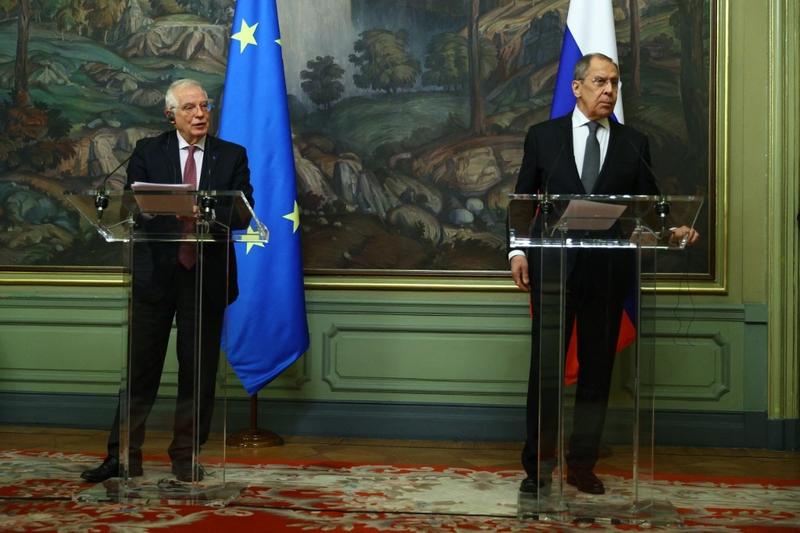 Russian Foreign Minister Sergei Lavrov and European Union High Representative for Foreign Affairs and Security Policy Josep Borrell hold a joint press conference following their talks in Moscow on February 5, 2021. (HANDOUT / RUSSIAN FOREIGN MINISTRY / AFP)
Russian Foreign Minister Sergei Lavrov and European Union High Representative for Foreign Affairs and Security Policy Josep Borrell hold a joint press conference following their talks in Moscow on February 5, 2021. (HANDOUT / RUSSIAN FOREIGN MINISTRY / AFP)
BRUSSELS / MOSCOW - Germany, Poland and Sweden expelled three Russian diplomats in a coordinated retaliation on Monday for the expulsion of three European Union diplomats by Russia while the EU’s foreign policy chief was visiting Moscow last week.
The tit-for-tat expulsions underscore the volatility in East-West relations and an erosion of trust among former Cold War foes, as the West accuses Moscow of trying to destabilize it and the Kremlin rejects what it sees as foreign interference.
The EU executive defended Josep Borrell over his trip to Russia where has said he had learned of the expulsions via social media while speaking with Russian Foreign Minister Sergei Lavrov in Moscow on Friday.
The tit-for-tat expulsions underscore the volatility in East-West relations and an erosion of trust among former Cold War foes
Kremlin spokesman Dmitry Peskov said on Monday the removal of diplomats from Germany, Poland and Sweden, accused by Moscow of taking part in protests last month against jailed Kremlin critic Alexei Navalny, took place a day before Borrell’s trip.
ALSO READ: Russia expels European envoys over Navalny protests
Germany’s Foreign Office, in a statement regarding its ejection of a Russian diplomat, said the German diplomat booted out by Moscow was only “carrying out his task of reporting on developments on the spot in a legal fashion”. Sweden echoed the German stance, calling the expulsions by Moscow “unacceptable”.
Poland’s Foreign Ministry said it ordered a member of Russia’s consulate in the city of Poznan to leave “in accordance with the principle of reciprocity and in coordination with Germany and Sweden.”
Russian Foreign Ministry spokeswoman Maria Zakharova said on state TV the three EU countries’ actions were “unjustified, unfriendly and a continuation of the same series of actions the West is taking against our country, which we qualify as interference in internal affairs”, according to Russian news agencies.
Peskov said Russia is interested in restoring ties with the EU, while it firmly opposes the latter interfering in its internal affairs.
ALSO READ: Russia to try jailed Navalny for slander amid EU talks
Russia never initiated the decline in relations with the EU, Peskov told a daily briefing, stressing the need to build a partnership based on non-interference and respect for each other's interests.
"We are strongly against interference in each other's interests ... Let there be no doubt that we will act decisively in this regard," he said.
"But this does not mean that we somehow want to distance ourselves or further worsen the already deteriorating relationship between Moscow and Brussels. On the contrary, we are interested in its development," he added.
Peskov's comments came a day after Borrell made pessimistic remarks on Russia-EU ties.
"My meeting with (Russian Foreign) Minister Lavrov and the messages sent by Russian authorities during my visit confirmed that Europe and Russia are drifting apart," Borrell said.
Appeal Ignored, Borrell Says
In a blog released late on Sunday, Borrell said his pleas to Russia to halt the expulsions were ignored. Estonia’s former defence chief Riho Terras, now an EU lawmaker, has started a campaign to call for Borrell’s resignation.
But the executive European Commission said it had no regrets about Borrell making his first trip to Moscow as the coordinator of EU foreign policy because Russia was on a course towards confrontation - which Borrell sought to avert.
ALSO READ: Russia bars more EU officials over Navalny sanctions
“The trip was necessary. One doesn’t give up on a trip because it looks difficult,” Commission spokesman Eric Mamer said in Brussels. “A trip is not a success or a failure on the basis of what happens during a particular moment.”
Peskov told reporters that Russian officials “were not the initiators of the collapse in relations”.
Borrell will on Tuesday address the European Parliament, which has called for sanctions to stop the completion of the Nord Stream 2 energy pipeline between Russia and Germany.
Some EU states are now intensifying a push for new Western sanctions against Moscow, two diplomats said.
Poland convened a two-hour-long video call with EU states on Monday that was joined by envoys from Britain, the United States, Canada and Ukraine, as well as two allies of Navalny, Vladimir Ashurkov and Leonid Volkov, to discuss policy on Russia, including sanctions.
Navalny was jailed on Feb 2 after a Russian court ruled he had violated the terms of a suspended sentence in an embezzlement case that he says was trumped up.
'Disconnecting' East and West
During Borrell’s visit, he and Lavrov gave a news conference at which the Russian minister described the EU as “an unreliable partner” and the Spaniard praised Russia’s COVID-19 vaccine.
Borrell went to Moscow to seek Navalny’s release and to try to relaunch EU-Russia relations. But in Sunday’s blog post, he said Friday’s news conference had been “aggressively staged” and the trip had been “very complicated”.
“Russia is progressively disconnecting itself from Europe and looking at democratic values as an existential threat,” wrote Borrell. “It will be for member states to decide the next steps, and yes, these could include sanctions.”
READ MORE: Lavrov: German accusations on Navalny 'groundless'
EU foreign ministers will discuss Russia on Feb 22.
Russia has been under Western economic sanctions since it annexed Crimea from Ukraine in 2014 but is also a major energy supplier that also helps the West in areas such as upholding the 2015 nuclear deal with Iran.


